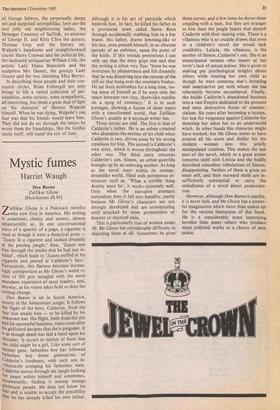Mystic fumes
Harriet Waugh
Don Bueno Zulfikar Ghose (Hutchinson £8.95)
Zulfikar Ghose is a Pakistani novelist who now lives in America. His writing is sometimes clumsy and uneasy, almost amateurishly so. In one conversational Piece of a quarter of a page, a cigarette is used as though it were a theatrical prop — `Zuazo lit a cigarette and looked dreamily at the passing jungle;' then, `Zuazo saw him through the smoke that he had just in- haled', which leads to 'Zuazo puffed at his cigarette and peered at Calderon's face.' Fortunately, this flatness becomes increas- ingly unimportant as Mr Ghose's weird vi- sion of life gets entagled with the more mundane experience of most readers, and, anyway, as his vision takes hold so does the writing change.
Don Bueno is set in South America, mostly in the Amazonian jungle. It follows the flight of the hero, Caldertin, from the fate that awaits him — to be killed by his unknown son. His flight, both from the city and his successful business, starts soon after his girlfriend declares that she is pregnant. It is as though death has laid a hand upon his shoulder. It occurs to neither of them that the child might be a girl. Like some sort of Mutant gene, fatherless boy has followed fatherless boy down generations of Calderon's forebears, with each son in- voluntarily avenging his fatherless state. Calderon moves through the jungle looking for peace within himself and sometimes, momentarily, finding it among strange grotesque people. He does not know his Laic and is unable to accept the possibility that he has already killed his own father,
although it is his act of patricide which bedevils him. In fact, he killed his father in a provinCial town called Santa Rosa through accidentally stabbing him in a bar brawl. His father, drawn lemming-like to his fate, even pressed himself, in an obscene parody of an embrace, upon the point of the knife. If this sounds pretentious I can only say that the story grips one and that the writing is often very fine: 'Soon he was overcome by pleasantness and felt dreamily that he was dissolving into the current of the still air that hung over the rosemary bushes. He sat there motionless for a long time, los- ing sense of himself as if he were only the space between two tiny, thorn-like needles on a sprig of rosemary.' It is in such passages, showing a fusion of inner states with a transformed world, that Zulfikar Ghose's quality as a mystical writer lies.
Three stories are told. The first is that of Calderon's father. He is an urban criminal who abandons the mother of his child when Calderon is two, driven away by his strong repulsion for him. The second is Calderon's own story, which is woven throughout the other two. The third story concerns Calderon's son, Simon, an urban guerrilla brought up by an unloving mother. As long as the novel stays within its strange, dreamlike world, filled with portentous ut- terances such as, 'What a terrible thing destiny must be', it works extremely well. Only when the narrative attempts naturalism does it fall into banality, partly because Mr Ghose's characters are not strongly developed and are uninteresting until attacked by some premonition of disaster or mystical pain.
This is particularly true of women under 50. Mr Ghose has considerable difficulty in depicting them at all. Sometimes he gives them curves, and a few times he shows them coupling with a man, but they are stranger to him than the jungle beasts that disturb CalderOn with their mating cries. There is a villainess who is so crudely drawn that even in a children's novel she would lack credibility. Leticia, the villainess, is the mother of Simon, Calderon's son. She is an emancipated woman who sneers at her lover's lack of sexual ardour. She is given to making pat psychological insights about others while treating her own child as though he were someone else's irritating and unattractive pet with whom she has reluctantly become encumbered. Finally, she builds CalderOn's abandoned business into a vast Empire dedicated to the grossest and most destructive forms of commer- cialism. Six years after becoming a tycoon, her lust for vengeance against Calder& for deserting her takes her to an underworld witch. In other hands this character might have worked, but Mr Ghose seems to have poured all his scorn and dislike for the modern woman into this jerkily manipulated creation. This makes the last part of the novel, which to a great extent concerns itself with Leticia and the baldly described schoolboy tribulations of Simon, disappointing. Neither of them is given an inner self, and their outward shells are in- sufficiently substantial to carry the melodrama of a novel about predestina- tion.
However, although Don Bueno is patchy, it is never dull, and Mr Ghose has a power- ful imagination which more than makes up for the various limitations of this book. He is a considerably more interesting novelist than many others who produce more polished works to a chorus of easy praise.














































 Previous page
Previous page